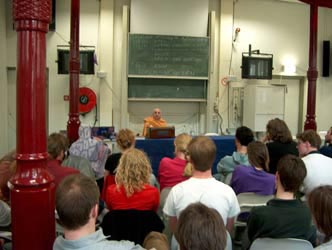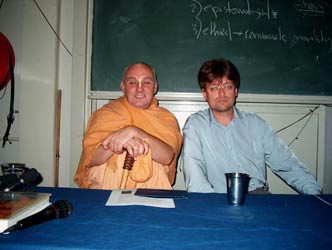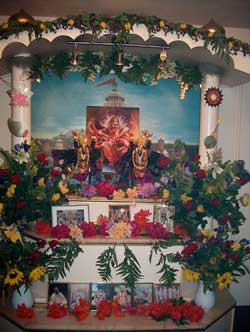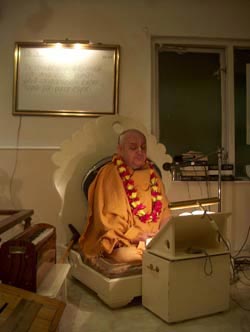In2-MeC
newly discovered entries of In2-DeepFreeze First Generation Animations

Amsterdam, The Netherlands
15 May 2003 (Nrsimha Chaturdasi)
Program at the University of Amsterdam, 14 May
| I lectured to a gathering of philosophy students at the University of Amsterdam in a program that started at 7:00 PM. My talk was similar to the one I gave at Nijmegen, but it was briefer since after me another speaker was scheduled to speak. At the end we two speakers had a discussion and answered questions from the students. |
 |
The second speaker was Andre van der Braak, who teaches philosophy at the U of A and at Luzac College in Alkmaar. He is soon to complete his PhD on Nietzsche and Buddhism. He will shortly publish a paperback entitled Enlightenment Blues--My Years with an American Guru.
I found this program very interesting in an amusing way. Poor Mr. van der Braak is very devoted to Friedrich Nietzsche, a 19th century thinker who prided himself in being a genuine "German philosopher. " All this really means is that Nietzche was a very frustrated individual who gradually lost faith in everything. He ended up as an incoherent madman for the last 10 years of his life.
Mr. van der Braak tried to be a spokesman for what he called "relative scepticism" towards God and religion, particularly Eastern religion of which he had some personal experience. By "relative scepticism" he meant that he will never insist that life has no ultimate meaning--although it became quite clear in his talk that this is exactly how he thinks. Thus in truth he is an absolute sceptic. But to appear reasonable, he must once in a while put in the footnote: "My scepticism is only relative. "
After studying philosophy at the U of A, van der Braak spent five years as a Buddhist and another eleven years as an Advaita Vedantist. Naturally his was a very Westernized practice of these Mayavadi philosophies. So naturally he got nowhere. Even if he had learned Buddhism and Advaitism in India he would have gotten nowhere. These are nowhere philosophies.
So after 16 years of chasing The Void, he has "realized" that all religious systems in the world are merely forms of cheating--although as a "relative sceptic" he pulls back one millimeter short from saying that directly. But he loves quoting Nietzsche who proclaimed to the world "God is dead. "
I felt I should act very relaxed in this gathering, as many of the students were themselves inclined to the sceptical line of thought and were perhaps hoping to be entertained by an outburst of "religious fanaticism" from my side. So I dealt with Mr. van der Braak in the Socratic maieutic manner of just asking him questions.
One point he repeatedly argued was that his "relative scepticism" was a way to clear the mind of "cosmic assumptions" in order to make room for finding the truth. Again and again he told us that for Nietszche, the ultimate reality is chaos (the total absence of order), which is opposed to the "cosmic assumption" that the world is given order by a God. But he was careful to drop the footnote that as a "relative sceptic" he was unable to say whether the world is chaos or kosmos (the word kosmos to the ancient Greeks meant an ordered universe). He just wanted room to conduct his own philosophical investigation into the nature of the world. I asked him if his investigation led him from Nietszche's chaos to a new realization of order, would he accept that order? He admitted that he would.
I pointed out that in making his presenation he was using language, and language is order in itself. He admitted that, but said language is only man-made, not absolute. I asked him whether he could prove that statement. He said no, he couldn't. I explained to the students that according to Vedanta there are deeper levels of language or sabda than human speech. Even human language is amazing, in that sounds issuing from a mouth or the squiggle of writing on a page somehow manifests information in our consciousness. The mystery of language is admitted even by Western philosophers.
A student spoke up that he thought that we just needed to say that "language is the way we communicate," and that solves the mystery of information exchange through words. This student also believed that language is man-made. "Are you sure?" I asked him. He answered, "One hundred percent. " I replied, "So in this way, at least, you are not sceptical at all. " The student smiled weakly.
I went on to say that some western scientists depict the "microworld" (the world of the fundamental "wave-particles" of matter) as a flux, an undulation, or wave, of potential energy. (This generally corresponds to the Vedic "sound in ether. ") "The whole universe is mysteriously given order by this underlying vibration. Man did not create that vibration," I told the group. At this point Mr. van der Braak's girlfriend had some kind of an "aha" experience. "Oh, now I see what you mean about deeper levels of language!" she mused aloud. Mr. van der Braak just nodded and smiled. I explained that matter is by itself chaotic, but it is given order by sound or language. We humans do it in a relative way, and God does it in an absolute way. Thus there is an absolute language that expresses the absolute truth.
I asked Mr. van der Braak what the practical consequences of his chaos doctrine are. . . I wanted to know if he could say with certainty that "Here we are at the University of Amsterdam, having a philosophical discussion," or if this experience we are having right now is just an illusion, since everything is "really" chaos. His answer: "I don't know. "
As I said, I found the program amusing. Well, what can be expected from a university that is located just one block away from the infamous Red Light District of Amsterdam? (For the innocent ones among my readership, the Red Light District of Amsterdam is several city blocks reserved for legal, open prostitution and drug use. ) When we left the Uni building it was 10:00 PM, and one could see down the street the eerie red aura of the neon lights of that sinful area. This aura spreads far beyond the visible glow of the red lights and casts a gloom over the university. I've done many programs at that school through the years and each time could feel the murk of ignorance in the air.
 |
|
With Andre van der Braak, an advocate of Nietszche's
"God is Dead" philosophy. Previously, as a Buddhist and a Mayavadi,
he had "religious experiences," but came to see them as having
no meaning. A textbook case of impersonal calamity.
|
Nrsimha Caturdasi Morning in Amsterdam Temple
 |
 |
|
Darshan of Sri-Sri Gaura-Nitai and Lord Nrsimhadeva,
Amsterdam
|
Giving Srimad-Bhagavatam class on Nrsimha-Chaturdasi
|
Notifications